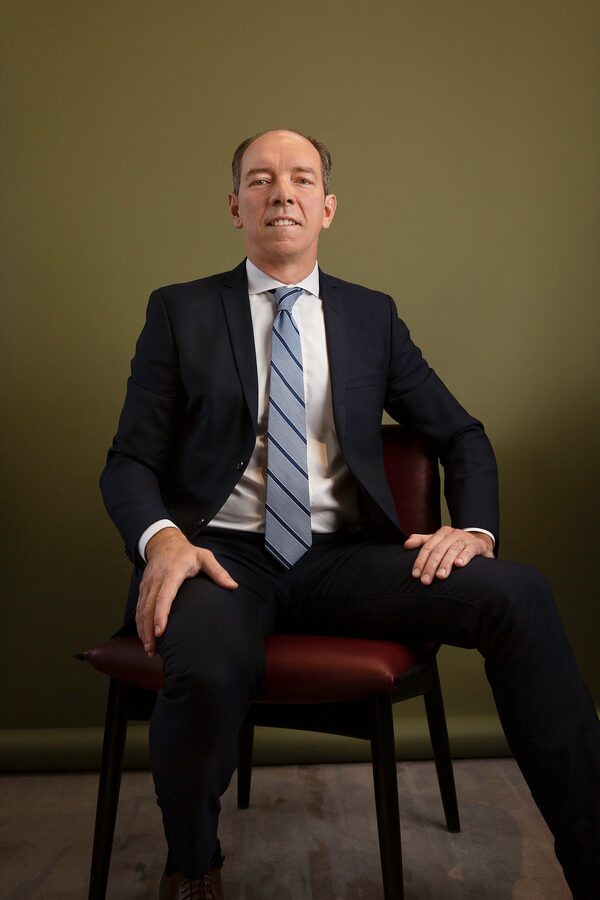
Benoit Gervais, senior vice-president, portfolio manager and head of the resource team at MacKenzie Investments.Ebti Nabag/The Globe and Mail
Benoit Gervais began his career during the last commodity boom and wasn’t prepared for a 13-year bear market that ended in early 2021. Many resource funds shuttered and peers lost their jobs. But Gervais, 48, and co-manager Onno Rutten retooled their resource funds so they all took on a global and sustainable investing approach. The assets of their five funds total $1.5 billion and include Mackenzie Global Resource II. It has always had a world mandate, and has outpaced the S&P Global Natural Resources Index over five years and almost matched it since Gervais started running the fund in 2004. We asked him why he uses environmental, social and governance (ESG) criteria and is bullish on natural gas producer Tourmaline Oil.
Resource funds aren’t seen as ESG-friendly. What’s behind your strategy?
That thinking was always present, but we now take a quantitative approach. We have a dedicated ESG analyst and do sustainability benchmarking. For environmental performance, we want to see progress and comparison with peers. To summarize, I want the improvers. People may buy shares of electric-vehicle maker Tesla to deal with climate change, but I say you have a far bigger impact buying shares of commodity companies to incentivize them to be cleaner. We own Alcoa, an aluminum producer that draws power from renewable energy, versus Aluminum Corp. of China, which uses coal. There isn’t a difference in commodity prices between good and bad actors yet, but the Russia-Ukraine war is bringing that awareness to the forefront. In the future, the ESG-friendly resource companies should benefit. That’s the opportunity.
China’s growth fuelled the commodity supercycle of the 2000s decade. Given the recent resource-stock rally, are we in a new one?
I think we’re at the beginning of a new supercycle with tailwinds from climate change and onshoring. Higher commodity prices will stem from the green movement—we call it the green premium. But commodities are not created equal. Copper, natural gas and lumber will have a supercycle, but if we talk about steel, I would say that it only applies to clean steel.
What commodity are you most bullish on?
Natural gas. Our team sees a 50% increase in global gas consumption from now to 2035. It’s the least offensive fossil fuel and is needed to supplement the grid because renewables like wind power are intermittent. We like Tourmaline Oil. It’s an ESG-friendly Canadian producer. It begins exports to a U.S. liquified natural gas terminal next year and should supply another terminal in Kitimat, B.C., once it’s completed. Its management team is also focused on returning cash to shareholders through regular and special dividends.
What about oil?
Oil’s growth will abate, but ESG-friendly oil will still be instrumental in the energy transition. I see a solid decade, or two business cycles, for oil companies, but the market is valuing them for less time than that. I own oil stocks because of the attractive valuation. We like Canadian Natural Resources. It has disciplined management that’s highly focused on reducing emissions.
West Fraser Timber and Interfor are among your holdings. Why do you like these forestry stocks when rising interest rates can hurt the housing market?
Rising rates are a headwind, but this is a longer-term play with tailwinds. There is still a housing shortage in just about every North American market. And lumber is a construction material that is environmentally friendly. Wood can sequester carbon and become a substitute for CO2-rich cement.
You also run the Mackenzie Precious Metals Fund. What’s your outlook for gold given a growing interest in bitcoin as “digital gold”?
I have been selling gold equities and gold bullion as one way to insure portfolios against the loss of purchasing power—particularly those with a lot of fixed-income investments. I don’t want to claim that bitcoin may not be insurance, but it hasn’t been tested yet. Given the regulatory risk with bitcoin and price behaviour that’s highly correlated with speculative assets, I don’t think that’s a good use for your money.
Your time is valuable. Have the Top Business Headlines newsletter conveniently delivered to your inbox in the morning or evening. Sign up today.